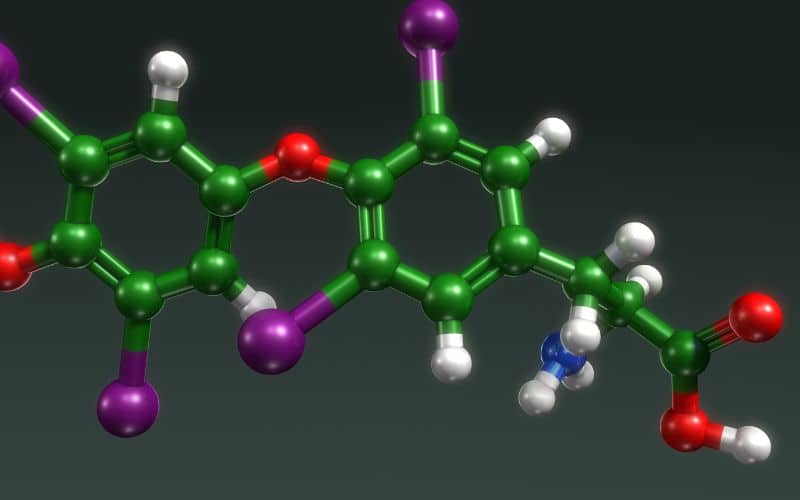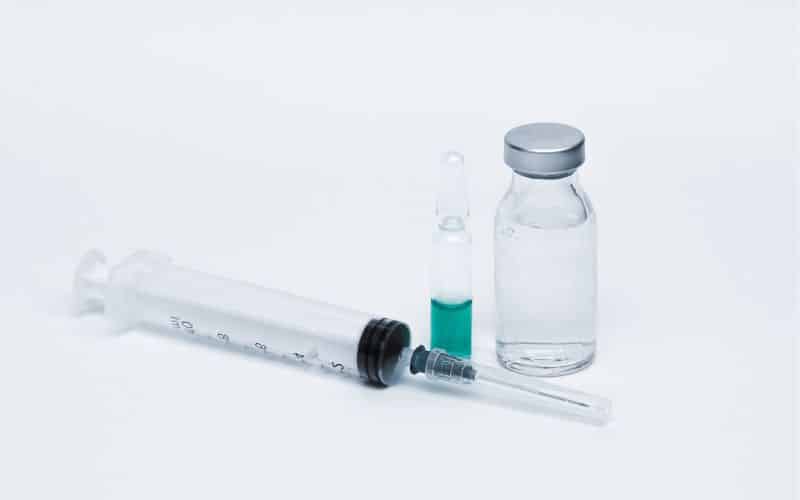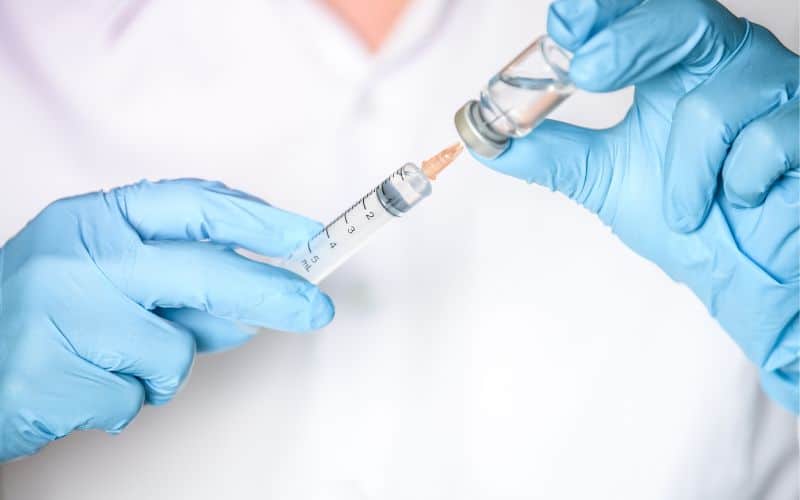Weight loss is a common goal for many people, but achieving it can be difficult. While diet and exercise are the most effective ways to lose weight, some people may turn to supplements or medications for extra help. One such option is weight loss peptides.
Peptides are short chains of amino acids that play important roles in the body, including regulating various physiological functions. Weight loss peptides are a type of peptide that can help promote weight loss by boosting metabolism, suppressing appetite, and increasing muscle mass. Some of the most commonly used weight loss peptides include CJC 1295, ipamorelin, MOTS-C, tesamorelin, and semaglutide. While these peptides can be effective for weight loss, it's important to use them under the guidance of a healthcare professional to ensure safety and efficacy.
Contents
Understanding Peptides

Definition of Peptides
Peptides are short chains of amino acids, which are the building blocks of proteins. They are naturally occurring molecules that play a vital role in various biological processes in the body. Peptides are typically produced by the body to regulate and control various functions such as metabolism, growth, and repair of tissues.
Types of Peptides
There are different types of peptides, each with its unique structure and function. Some of the most common types of peptides include:
- Growth Hormone Releasing Peptides (GHRPs): These peptides stimulate the release of growth hormone in the body. They are commonly used in anti-aging and bodybuilding supplements.
- Growth Hormone Secretagogues (GHSs): These peptides also stimulate the release of growth hormone in the body. They are used to treat growth hormone deficiency and other conditions that affect growth.
- Melanocortin Peptides: These peptides regulate skin pigmentation, appetite, and sexual function.
- Opioid Peptides: These peptides interact with the body's opioid receptors to relieve pain and induce feelings of pleasure.
- Insulinotropic Peptides: These peptides stimulate the release of insulin in the body. They are used to treat diabetes and other conditions that affect insulin production.
Peptides are available in various forms, including oral supplements, injections, and creams. They are also used in cosmetics and skincare products to improve skin texture and reduce the appearance of wrinkles.
In conclusion, peptides are short chains of amino acids that play a crucial role in various biological processes in the body. They are available in different types and forms and are used for a wide range of purposes, including weight loss, anti-aging, and muscle building.
Weight Loss Peptides
Peptides are short chains of amino acids that play a crucial role in various biological processes. Peptides are widely used in the field of medicine and health for their ability to regulate hormones, improve immune function, and promote tissue repair. One of the most popular applications of peptides is in the field of weight loss.
Function of Weight Loss Peptides
Weight loss peptides work by influencing the body's metabolism and fat-burning processes. Peptides can increase the release of gut hormones that can increase the feeling of fullness. Some peptides can improve insulin secretion and function, reducing blood sugar levels and preventing the accumulation of fat. Others can stimulate the breakdown of fat cells and increase energy expenditure, leading to weight loss.
Examples of Weight Loss Peptides

Here are some examples of weight loss peptides:
- Semaglutide: It acts as an agonist for glucagon-like peptide 1 and maintains blood hormone levels of glucagon. The clinical trials show a 15% weight loss in the subjects, thus proving its effectiveness.
- Tesamorelin: It is well-known for managing HIV-associated lipodystrophy. It works by stimulating the production of growth hormone, which can increase lean muscle mass and reduce body fat.
- CJC 1295: It stimulates the production of growth hormone, which can increase lean muscle mass and reduce body fat. It can also improve sleep quality and enhance immune function.
- Ipamorelin: It stimulates the production of growth hormone, which can increase lean muscle mass and reduce body fat. It can also improve bone density and reduce inflammation.
- MOTS-C: It can increase energy expenditure and improve insulin sensitivity, leading to weight loss. It can also improve muscle function and reduce inflammation.
Weight loss peptides can be administered in various forms, including injections, oral supplements, and transdermal patches. It is important to note that weight loss peptides should always be used under the guidance of a qualified healthcare professional.
Benefits of Weight Loss Peptides
Peptides for weight loss are becoming increasingly popular among people who want to lose weight and improve their overall health and wellness. These naturally occurring molecules are made up of amino acids and have a wide range of benefits, including:
- Promoting weight loss: Peptides for weight loss can help to promote the metabolism of nutrients, increase lean muscle mass and strength, and reduce body fat. They can also help to suppress appetite and reduce cravings, making it easier to stick to a healthy diet and achieve weight loss goals.
- Improving overall health: In addition to weight loss, peptides can also promote lean muscle mass, slow down aging, increase bone density, prevent inflammation, enhance wound healing, and support the immune system. This makes them a great choice for people who want to improve their overall health and wellbeing.
- Reducing the risk of chronic diseases: Peptides can help to reduce the risk of chronic diseases such as diabetes, heart disease, and cancer. This is because they can help to regulate blood sugar levels, reduce inflammation, and improve overall health and wellness.
- Enhancing athletic performance: Peptides can also help to enhance athletic performance by increasing endurance, improving recovery time, and reducing muscle fatigue. This makes them a popular choice among athletes and fitness enthusiasts.
Overall, peptides for weight loss offer a wide range of benefits that can help to improve overall health and wellbeing. Whether you are looking to lose weight, improve athletic performance, or reduce the risk of chronic diseases, peptides can be a great addition to your diet and lifestyle.
Side Effects and Risks of Weight Loss Peptides
While weight loss peptides can be effective in aiding weight loss and promoting muscle growth, they can also come with potential side effects and risks. It is important to understand these risks before beginning any peptide regimen.
One of the most common side effects of weight loss peptides is water retention. This can lead to bloating and a puffy appearance. Headaches are also a possible side effect, especially with certain types of peptides.
Another potential risk of weight loss peptides is contamination. Generic peptides may not be as pure as brand-name peptides, leading to the presence of toxins that can be harmful to the body. It is important to only purchase peptides from reputable sources and to ensure that they are properly stored and handled.
In addition, some individuals may experience allergic reactions to certain peptides. Symptoms of an allergic reaction may include hives, itching, and difficulty breathing. If you experience any of these symptoms, it is important to seek medical attention immediately.
It is also important to note that weight loss peptides are not a magic solution for weight loss. They should be used in conjunction with proper diet and exercise for best results. It is recommended to consult with a healthcare professional before beginning any peptide regimen to ensure that it is safe and effective for your individual needs.
How to Use Weight Loss Peptides

Weight loss peptides can be used in a variety of ways, depending on the specific peptide and individual goals. Here are some general guidelines for using weight loss peptides:
Dosage
Dosage will vary depending on the specific peptide, but it is important to follow recommended dosages and not exceed them. Overdosing can lead to negative side effects and potentially harm your health.
Administration
Peptides can be administered through injections, creams, or orally. Injection is the most common method because it allows for the most precise dosing and absorption. However, oral peptides can be more convenient for some individuals.
Timing
Timing of administration is important for optimal results. Some peptides are best taken in the morning, while others are best taken before bed. It is important to follow recommended timing guidelines for the specific peptide being used.
Stacking
Stacking refers to using multiple peptides at once. This can be beneficial for synergistic effects and maximizing results. However, it is important to research and understand the potential interactions and side effects of each peptide before stacking.
Diet and Exercise
Peptides are not a magic solution for weight loss. They should be used in conjunction with a healthy diet and regular exercise routine for optimal results. Peptides can help enhance the effects of diet and exercise, but they should not be relied on as the sole method of weight loss.
Overall, using weight loss peptides requires careful research, dosing, and administration. It is important to understand the potential benefits and risks before incorporating peptides into your weight loss regimen.
Scientific Research on Weight Loss Peptides

Peptides are small chains of amino acids that play an essential role in various physiological processes in the human body. Over the years, scientific research has shown that peptides can be used as a potential treatment for obesity and weight loss.
Several studies have been conducted to investigate the efficacy of different types of peptides for weight loss. One study published in the Journal of Medicinal Chemistry found that a peptide called oxyntomodulin can reduce appetite and increase body temperature, leading to weight loss. Another study published in the journal Nature discovered that a peptide called amylin can be used in combination with leptin as a weight loss therapy.
Moreover, a review published in the journal Peptides discussed the progress and new trends in peptide research that may provide novel targets for the prevention and treatment of obesity. The review highlighted various peptides that have shown promising results in reducing body weight, including GLP-1, PYY, and oxyntomodulin.
Peptides have also been found to be effective in producing significant weight loss in individuals with type 1 and 2 diabetes. A study published in the Journal of Clinical Endocrinology & Metabolism found that the administration of a peptide analog called liraglutide resulted in sustained weight loss in diabetic patients.
Overall, scientific research has shown that peptides can be an effective and safe option for weight loss. However, more studies are needed to determine the long-term effects and safety of using peptides as a weight loss treatment.
Conclusion
In conclusion, weight loss peptides have shown promising results in aiding weight loss, increasing lean muscle mass and strength, and improving overall health and wellness. Peptides such as CJC 1295, ipamorelin, MOTS-C, tesamorelin, and semaglutide have been found to be effective in reducing body weight and fat mass in clinical trials.
Peptides work by promoting the metabolism of nutrients, reducing appetite, increasing body temperature, and maintaining blood hormone levels. They are a potential anti-obesity agent that can be administered for a longer period. However, it is important to note that more studies need to be carried out in vivo to fully understand their efficacy and safety.
Peptides can be taken orally or through injections, with injections being more effective due to their direct delivery into the bloodstream. Peptides also have other benefits such as improving sleep quality, reducing inflammation, and promoting wound healing.
It is important to consult a healthcare professional before starting any peptide therapy, as they can have potential side effects such as nausea, headache, and joint pain. Overall, weight loss peptides show great potential in aiding weight loss and improving overall health and wellness, but more research is needed to fully understand their effectiveness and safety.






